Oy gevalt what’s with this meshugganah Easter season? The last time I put something out specifically for Easter (the Shick Sunn Classic TV epic Greatest Heroes of the Bible: Volume One review), we were in the middle of a deliberately manufactured global lockdown that was designed by our elitist overlords as a dry run for who-knows what’s to come…and God didn’t do anything about it (or them). To say I was in a snit with His rather, shall we say, casual attitude about the whole thing is an understatement, and it convinced me not write any more about Him or his people.
By Paul Mavis
There are no atheists in foxholes, however, nor, apparently, when it comes to deadlines and chemically-imbalanced editors, so…what say we look at Paramount’s Volume Two release, as well, huh? If you haven’t already bookmarked it (you got a problem, maybe?), I recommend you read that Greatest Heroes of the Bible: Volume One review first, to get some background on Sunn Classics and this NBC series. I could just port sections of it over here and lard up this review–after all, we literary scribes are paid a penny a word at this dump–but quite frankly I just don’t have the strength. This has been an extremely trying week (I’m switching from gin to vodka for my gimlets and I’m just a frazzled heap).
Click to order Greatest Heroes of the Bible: Volume Two – God’s Chosen Ones on disc:
So…you’ve read that first review and you’re ready for more? Saints preserve us. Okay: Greatest Heroes of the Bible: Volume Two – God’s Chosen Ones, which includes The Story of Moses, Joshua and Jericho, The Story of Esther, and Abraham’s Sacrifice. Let’s get right to it: how are they? Well…two (The Story of Moses sorta, but really Joshua and Jericho) are the kind of delicious crap I’d expect from Sunn.
For Joshua and Jericho specifically, the dialogue is oftentimes comically overstated (in that delightfully florid, declarative, faux-Biblical style from so many earlier Hollywood religious epics); the production is simultaneously outrageously ambitious and incredibly chintzy (check out the pasteboard and canvas walls of Jericho wobbling in the breeze); and the performances range from embarrassingly pretentious here (Robert Culp, who else) to, um…awful (the mesmerizingly bad Sydney Lassick…no wait: he’s cosmically dreadful).
Distressingly, the other two episodes in this volume (The Story of Esther, and Abraham’s Sacrifice) are somewhat reasonable attempts at cheap religious TV drama. And that would be fine…if it was a Sunday morning in 1975 and I was watching Insight instead of WXYZ Channel 7’s The Abbott & Costello Theater because they finally worked their way down to the dire Dance With Me, Henry. I don’t want tepid earnestness and okay performances in a Sunn Classics effort. I want completely calculated wretchedness.
First up is The Story of Moses, starring John Marley and more importantly, his gorgeous head of hair (beautifully washed, set, and combed-out, I might add), back from Volume One as the man with God’s plan, Moses. Now that God has laid down The Law, it’s time for the Chosen People to split from evil Pharaoh (Joseph Campanella). Pharaoh’s advisors (Robert Alda, Lloyd Bochner) sneer that the Jews are just loafing it, but apparently Moses means business: let my people go, or I swear to Jehovah that the work stoppage on those bricks will make an ILWU dock worker’s strike look like a potty break.
Of course this stiff-necked Hebrew defiance enrages Pharaoh, who increases the Jewish slaves’ work quotas…which in turn ticks off God, who decides a nice set of plagues are in order for uppity Pharaoh. So guess who wins. The minute Robert Alda and Lloyd Bochner appear, both made up in full Cover Girl glory (maybe it’s Maybelline?), and start camping around like the road company of La Cage Aux Folles, high hopes are indeed set for The Story of Moses.
Alas, their bitchy, hilarious parts are brief, and we’re stuck with the likes of brawny Joe Campanella, pulling a surprisingly credible British (?) accent as Pharaoh (he’s actually not half-bad), and Frank Gorshin unattractively, nastily grimacing and shouting like he always did in anything other than Batman (he had to know he didn’t deserve the crappy career he wound up with). The worst, though, is Marley, who delivers his lines in the same hoarse, uninflected, declaratory manner, regardless of the line’s import, each and every time (at my local deli I’ve heard, “I’ll have a pastrami on marble rye!” put over with more feeling than his remarkably colorless, “Let my people go.” And watch him tap-tapping his staff at Pharaoh’s door. Positively feeble).
Seriously: you couldn’t find anyone else with hair to play Moses, other than Marley? Finally, the funniest part of The Story of Moses is not what you would expect–the parting of the Red Sea, which looks to be a $1.98 chroma key wonder–but rather…the slow realization that Marley has a chili dog stain on his tunic, and the producers had not either the time nor the extra tunic, to have him change it. Now that’s Sunn Classic!
This is more like it: Joshua and Jericho. Joshua (Robert Culp) knows that the decadent, morally corrupt city of Jericho stands between freedom for his people, and death, so it must fall. But how? God (who else) has a plan, but Joshua’s subordinates are having a hard time believing that just marching around Jericho’s walls every day, while sounding their trumpets, will somehow bring down the city.
Meanwhile, crazy-as-a-june-bug-on-a-hot-skillet King Agadiz (Sydney Lassick) wants to either have an orgy with everyone…or have them all put to the sword, the latter a plan his general Assurabi (Cameron Mitchell) can definitely get behind. Intrigue at the court increases when former “dancing girl” Rahab (Sondra Currie, ridiculously, perfectly coiffed) decides to aid the rebels in attacking Jericho. Okay, so…what’s with all the lead actors affecting phony limey accents in this group of Greatest Heroes of the Bible episodes? Culp does it here, too, although not nearly as well as Campanella in the previous outing. Did someone think it would make these quickies sound more “respectable?” More “epic?”
Hard to say…but it’s hilarious, particularly when already pretentious-as-hell Culp attempts it. An actor who always had a terminal case of the “cutes,” Culp is up to his usual shenanigans, pulling out his patented array of phony pauses and hesitations and faux-meaningful glances off into space before he delivers one affected line-reading after another (even the simplest business in his hands comes off as phony–watch him sharpen that sword, childishly ignoring the other actors like he’s Brando picking at his navel: it’s a hoot).
Thank god for Cameron Mitchell and Sydney Lassick. Exploitation superstar Mitchell, sporting an iron grey hairdo (wig?) that’s a cross between Jane Wyman circa 1954 and Spock’s father on the o.g. Star Trek, gets to yell and bulge out his eyes and neck veins every few minutes, growling out gems like, “You are nothing but the biggest hog in this stinking swine-filled pigpen!” and “Come to me, Joshua! Come to death!” Thank you, God, for at least that.
Even better (on another astral plane, really) is Sydney Lassick, best known as one of the inmates from One Flew Over the Cuckoo’s Nest and Sissy Spacek’s douche bag English teacher in Carrie. Screwing up his face into perverted joy/rage/impotent frustration, Lassick, eyes shut tight, screams in horror to the ceiling, “Why must you always shame me!? I am the King of Jericho!” to such absolutely hysterical effect, it’s difficult to take the rest of the episode seriously, such is the imbalance (you just wish the whole episode had been about him). By the time a nicely-animated William Daniels calls him fat and disgusting, as Lassick squeals like a stuck pig when the cardboard walls of Jericho come down in rather unimpressive flashes of lightning, you know you’ve seen a Schick Sunn Classic production.
…and then come the “respectable” outings. Now, let’s be clear: The Story of Esther and Abraham’s Sacrifice won’t be giving Jesus of Nazareth, NBC’s massive miniseries success from the previous year, a run for its money. They’re merely…reasonably acceptable. But even that low bar is an accomplishment worth noting for Schick Sunn Classic Productions, so give them their due. Both were written by TV pro Norman Lessing, and directed with a more measured approach by Jack B. Hively (it’s safe to say they’re responsible for the change in tone from other entries in the series).
Fear not, though; Schick Sunn mile markers inevitably pop up. In Esther, it’s the appearance of “The Big Ragu” (!) as Uri the rebel fighter (boy is he earnest in his blandness) and none other than Pamela Sue Barnes as Queen Esther. Victoria Principal is gorgeous, of course, but her, um…stacked charms are hidden by too many robe ensembles, while that curiously neurasthenic allure she has (like permanent dental work) morphs from “erotic” to “uninteresting p.o.a.” real quick.
And I’m sorry, but talented Robert Mandan (Soap‘s Chester) is so naturally amusing I just couldn’t take him seriously as King Xerxes, the other half of that romance of the ages (I kept expecting him to rage…and then drop to his knees, mugging and begging Principal to just understand him, in Mandan’s always amusing manner). Still…the dialogue is acceptable, and the story at least moves, while supporting work from Michael Ansara is quite good, as expected.
Abraham’s Sacrifice is even better; only the overripe presence of Lainie Kazan (!) as Hagar mars an otherwise simple, straightforward, and surprisingly involving take on this familiar story (when Kazan hears her son is fated to die, she can’t resist pulling a mug, laughably convulsing like she ate a bad clam). Three of the best voices in television–Gene Barry as Abraham, Andrew Duggan as King Herabol, and Ed Ames as Lot–help make the spare, to-the-point dialogue sound appropriately important, with pros Ross Martin and Beverly Garland rounding out the best cast (so far, at least) that I’ve seen for these Greatest Heroes of the Bible episodes.
Finally, some cool, stylized sets show up (Duggan’s throne room), while the location shooting in Page, Arizona, has a bit of scope to it, with a nicely-realized finale as rocks and boulders crush Duggan’s forces, the movie switching to an effective monochrome during God’s wrathful storm. It’s a lean, simple, nicely executed episode. I just wish it had been a little more awful. Still…any Sunn Classic lovin’ is good lovin’, as far as I’m concerned.
Read more of Paul’s TV reviews here. Read Paul’s movie reviews at our sister website, Movies and Drinks.





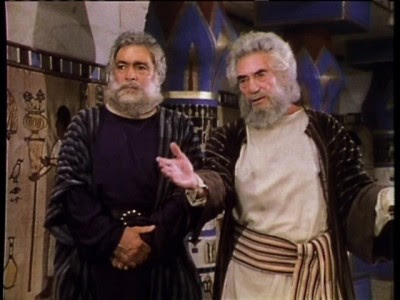
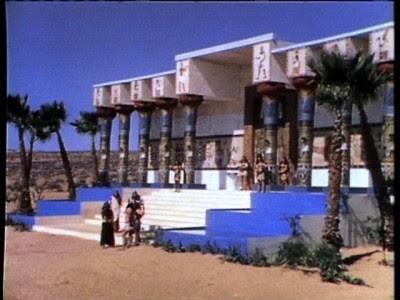




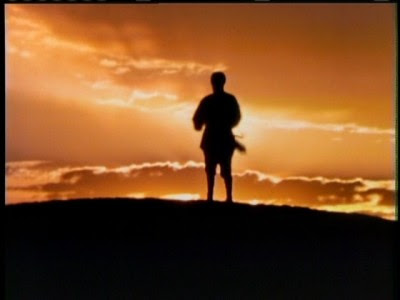
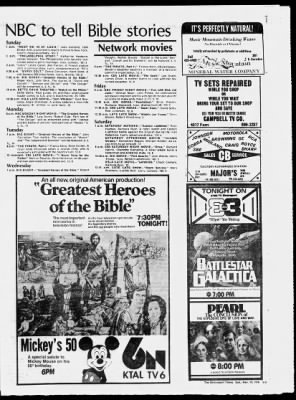




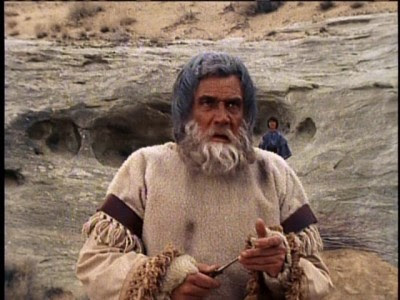


I wonder what the pay scale looked like? Most of the people here (Campanella, Ansara, Martin, Mandan, Culp) had been in-demand characters actors at one time but were about 10 years past their peak. Maybe they worked cheap just for the exposure?
LikeLike
Certainly possible…some might have also been network contractual obligations getting paid off. Hard to say, but no matter how “small peanuts” they probably were, they still paid way better than most people working regular jobs. A guy wrote to me once who said he was involved in this series, and that the behind-the-scenes stories were crazy….but he never contacted me again, despite my begging for info.
LikeLike